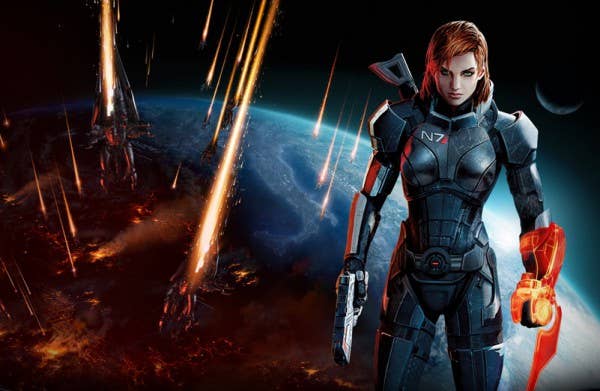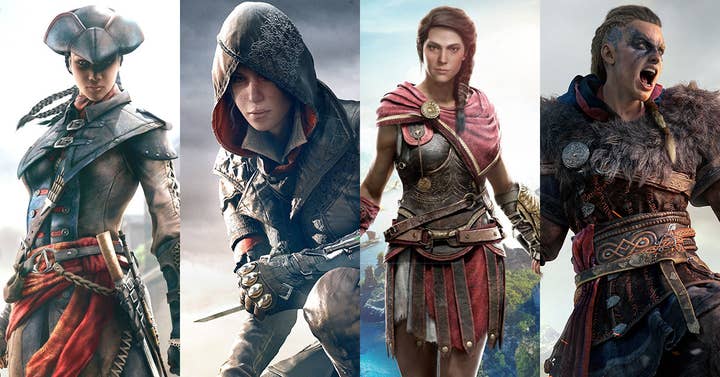"If you're still marketing to white cis males, you're alienating more than half your players"
Assassin's Creed Sisterhood co-founder Kulpreet Virdi on the importance of putting defined female characters in the spotlight
"Women don't sell video games."
That's one of the attitudes allegedly expressed by Ubisoft's marketing department and management on 2018's Assassin's Creed Odyssey, mandating the game needed a playable male as an alternative to Kassandra.
But Kulpreet Virdi, founder of the fan movement Assassin's Creed Sisterhood, is urging games firms to move beyond this outdated perception -- and she believes the way new releases are promoted is crucial.
"It's a really backwards way of thinking," she says. "When you market your game to men, you're ultimately ostracising 50% of your playerbase... There's a misconception that women just play cutesy games like Stardew Valley, The Sims, Animal Crossing. That just needs to go away. The playerbase has changed.
She adds, "It's this vicious circle we really need to break -- and there have been games that have broken that circle, like Horizon Zero Dawn, the Tomb Raider series, The Last of Us with Ellie and Abby front-and-centre. The problem is there's just a general lack of marketing campaigns that focus on women, and the marketing campaigns that focus on men tend to do really well because they've got the budget, the support behind them."

Virdi founded AC Sisterhood back in July, amid the slew of accusations concerning abuse, harassment and toxic attitudes at Ubisoft -- including the notion that female protagonists don't sell video games.
A long-time fan of the Assassin's Creed series, the IP and commercial lawyer dedicated her spare time to creating a safe space for women to talk about the games and other aspects of the hobby without being attacked, as often occurs on social media.
Virdi describes the Sisterhood as "an empowering movement," centred around a heavily vetted Discord server, with a Sisterhood Speaks podcast highlighting the work of the many talented women employed at Ubisoft. And the group's mission is to "positively challenge" the publisher, to convey "we see what you're doing and we expect better."
Ubisoft has acknowledged and supported the movement in various ways since its creation, even including the group's logo in Assassin's Creed Valhalla as a tattoo option for Eivor and referencing a sisterhood of female assassins via in-game text. But Virdi hopes to see more.
"They've acknowledged that we're here, and I hope that translates to tangible change in the future," she says. "We're not expecting things to change straight away because things like this never do, but it's about getting more awareness around the topic."
She continues: "I've always wanted to see a[n Assassin's Creed] game where the woman is in the lead, not a diminished or supporting role. Seeing everything that happened, I decided to speak up and do something about it, to say that this needs to change... because if no one does that, nothing will change. You need to challenge the status quo."
"If AAA put women in their marketing and their games, it sends a strong message that women belong in this industry"
While the Sisterhood has been using its channels to highlight some of the female protagonists already seen in the series, it notes that there is still yet to be a main-line Assassin's Creed with a woman as the sole lead. The majority of these characters have been reserved for smaller projects: Aveline only features in the PlayStation Vita spin-off Liberation, while Shao Jun is constrained to 2D spin-off Assassin's Creed Chronicles: China. Even Origins' Aya and Syndicate's Evie Frye are only playable for select sections of their games.
Virdi points to the missed potential with many of these. Aveline demonstrates that new mechanics and narrative avenues can be unlocked by focusing on a female protagonist: the Black assassin can disguise herself as a slave to enter areas unnoticed, or as a noble lady to flirt with guards in order to lure them away from their post.
"There's only positive things that can come out of exploring a character who's a woman, who's from a different background," Virdi says. "You get a different experience than you would when you play from a white male's perspective. Gamers do want a more diverse experience when you're playing these games because you're going to explore narratives and themes that you might not if the character is the default white cis male."
Aya from Origins is another prime example. The game focuses entirely on male hero Bayek's quest for revenge after the murder of their son -- and while it's important not to undermine the importance of having a Black man as the lead of a AAA video game, Aya is still underserved by the lack of interactions between her and the son. Her playable sections are primarily a way to get the fan-favourite naval battles into Origins, rather than an exploration of how a mother copes with the loss of her child. That narrative is entirely absent.
"That was something that game really missed and a lot of fans, including myself, wanted to see more," says Virdi. "You saw the paternal bond, but not the maternal bond."

Granted, the last two major Assassin's Creed titles have allowed you to play as a woman throughout the whole experience: Kassandra in Odyssey, and a female version of Eivor in Valhalla. But while Kassanda is canonically the hero of Odyssey -- at least according to the novelisation -- her brother Alexios was the game's cover star. Similarly, Valhalla was unveiled with male Eivor front and centre; the first sign of female Eivor's existence was an image of the special edition, in which she is included as a collectible statue.
This leads us to Virdi's main point: it's not enough to have female characters in your game -- they need to be in your marketing as well.
In this regard, Ubisoft somewhat addressed this by releasing two versions of Valhalla's cinematic trailer -- one for each gender.
"That was incredible," says Virdi. "It was the same trailer but just with female Eivor in place of the male one -- that produced so many positive comments from women in the community. I remember feeling overjoyed, seeing a woman I can identify with as the focus of the trailer. I can't even tell you how empowering that felt.
"There's only positive things that can come out of exploring a character who's a woman, who's from a different background"
"Companies need to understand how people feel when they see themselves represented properly and in an authentic way. It's such an amazing feeling, and if they're making their players feel that way, that's great."
In the past, publishers have solved the box art issue by offering reversible covers. Both Assassin's Creed Odyssey and Valhalla allow fans of the female hero to flip the cover slip, but the male character is still the default on the front. In the case of Valhalla, Virdi tells us the community was calling for both to be on the cover -- especially as the narrative canonically alternates between the two.
"It's all well and good saying they are equal, but if the marketing doesn't reflect that, it's not going to send out a good message," she says.
It's not just Assassin's Creed, of course -- many AAA franchises face these issues. The original Mass Effect trilogy saw fans call for the female Shepard to get more time in the spotlight, but beyond another reversible cover, the focus was almost always on her male counterpart.
However, EA addressed this with the recent Legendary Edition trailer, which focused only on the female version of the hero.
"The Mass Effect fans have been rallying for years for more representation on Femshep, so to have a trailer focused on her was amazing," says Virdi. "Watching the video of Jennifer Hale reacting made me cry. This is how we want people to feel.
Virdi goes on to praise BioWare and EA for its handling of the studio's other big franchise: Dragon Age. The most recent outing, 2014's Inquisition, featured cover art with a gender-neutral hero -- another alternative to focusing on the man when marketing.
"It's all well and good saying they are equal, but if the marketing doesn't reflect that, it's not going to send out a good message"
But there's a systemic issue at play here, too: the lack of female protagonists. While an annual analysis shows this is improving, defined female characters are still a minority when it comes to games protagonists. If there aren't women to include in the marketing, how can the way games are promoted improve?
That phrase 'defined female character' is also important. While many games give players the option of playing as either a man or woman, as soon as the choice is presented it diminishes the woman to just that: an option.
"For me, it shows you're not prepared to commit to a female character," says Virdi. "I think companies rely on the male version to be their backup for men who don't want to play as women -- and that's unfortunate because then the narrative is the same.
"Sometimes you're playing these games and the character will say something that seems really weird if you're playing as a certain gender. It doesn't work, and sometimes it can break the narrative. It's a better approach to focus on one and really concentrate on their character development, their story, and make sure their representation is authentic and sensitive."

The emphasis here is on authenticity. Women should be depicted as respectfully as male characters are, rather than being positioned as the hypersexualised digital pin-ups of the past -- doing so only ends up marketing these women to a male audience. Virdi is also keen to see female characters presented in a way that highlights their uniqueness and in ways that are distinct from men.
"Women in video games don't always have to be an equivalent to a man," she says. They don't have to be a superwoman, you can show their vulnerabilities in the same way you can show those of men.
"Look at Ellie and the way she is in the [Last of Us] games -- there is her exterior toughness but also her vulnerabilities as well. As a woman, you relate to that because you're not taking what's traditionally expected from a man and putting a woman's skin on it. It's actually going deeper than that and exploring authentic reactions, how women would react in that scenario."
Virdi believes it is important for developers and publishers across the board to focus on more diverse protagonists -- both in games and in marketing -- but AAA firms have the power to make a more positive impact on the industry by doing so.
"If you're a AAA publisher and you're still marketing your games in a manner that's aimed at white cis males, you're not marketing to more than half your playerbase," she says. "You can end up alienating them and they're going to end up walking away.
"Personally, I think if AAA put women in their marketing and their games, it sends a strong message that women belong in this industry, that they are here to play games and here to stay. Hopefully, that would help alleviate the toxic culture around women in games and games communities. Publishers should be doing more to address harassment, and if they highlight their women more in a positive way, that is a strong message to send out."



